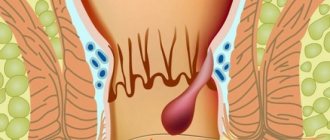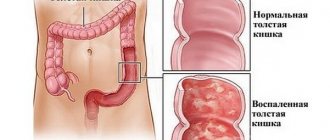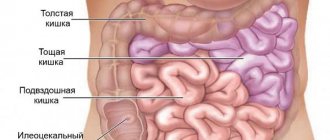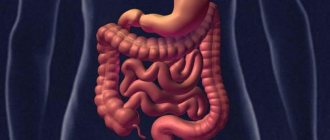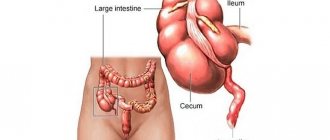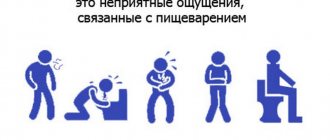Is mucus secretion normal?
Mucus is produced by the gastrointestinal tract in absolutely any person. A small amount of this substance is necessary in order to lubricate the intestinal walls, ensure the sliding of feces when moving to the exit, and prevent injury to the mucous membrane.
In a healthy person, mucus is secreted in such quantities that during bowel movements it is completely invisible. In the presence of hemorrhoids, mucus is produced in greater quantities.
Even with varicose veins of the rectum, there should be no involuntary mucous discharge.
Their presence indicates either the neglect of the pathological process, or the presence of complications and concomitant diseases.
Discharge is mucus that is not released during bowel movements, but after or before it. That is, such problems can arise in a completely calm state.
The presence of a small amount of mucus, visible to the naked eye, during bowel movements is acceptable. After all, with hemorrhoids there is an inflammatory process that causes mucus to be released in greater quantities than usual. However, even in this case, the mucus should be absolutely transparent. Pink, scarlet, green and yellow veins indicate the presence of serious pathologies.
The secretion of mucus, regardless of defecation, is a pathology. Therefore, if such a sign is detected, you must immediately contact a proctologist and undergo an examination to rule out oncology and other serious pathologies with similar symptoms.
Types of discharge for hemorrhoids
When discharge appears, this means that the disease is progressing and has reached the second or third stage. Moreover, there may not be severe pain or itching. It is important to see a doctor as soon as possible to prevent serious complications.
What discharge from hemorrhoids should be a reason for examination?:
- abundant mucous;
- mucus mixed with blood;
- purulent greenish;
- oily;
- mucus mixed with undigested food;
- bile.
Rectal mucous membranes
This is the most common symptom of hemorrhoids . Usually mucus is released during bowel movements. This is a viscous transparent substance, it is produced by the cells of the intestinal mucosa to protect them and hemorrhoids from irritation by feces. In the presence of inflammation, its quantity increases, and disruption of the sphincters leads to its free flow.
Mucous discharge is often accompanied by itching, irritation, and a burning sensation . Ulcers and wounds appear. In advanced cases, there is a lot of discharge; it flows out of the anus regardless of bowel movements.
Mucus with blood
The appearance of blood impurities indicates damage to the hemorrhoids from feces or injury during physical activity. Most often these are small bloody streaks. If too much blood is released, up to 50 ml per day, signs of anemia are observed.
When such discharge appears, it is necessary to be examined to exclude intestinal tumors and other serious pathologies. It is especially dangerous when a clot of dark blood is released or the stool turns black. This is a sign of stomach bleeding.
Purulent mucous membranes
When the mucus becomes cloudy, too thick and acquires a foul odor, this indicates the development of a purulent infection . Such greenish or yellowish discharge appears not only during bowel movements. Pus constantly flows out little by little. Because of this, the laundry gets dirty and starts to smell unpleasant.
This happens with suppuration of cracks or ulcers , paraproctitis, fistula formation or thrombosis of hemorrhoidal veins. The patient experiences signs of intoxication, constant pain in the anal area and a feeling of incomplete bowel movement.
Oily
appears on stool and mucous secretions if hemorrhoids are associated with damage to the liver or pancreas. This leads to impaired absorption of fats, they are released through the intestines and aggravate the symptoms of hemorrhoids.
Other
Other types of rectal discharge are less common. This usually indicates the development of concomitant diseases :
- in case of gallbladder diseases, streaks of bile are noticeable in the mucus;
- the discharge of white pieces similar to cottage cheese is a sign of intestinal candidiasis;
- mucus mixed with feces or undigested food indicates intestinal dysfunction.
Can there be after surgery?
Often, mucous discharge appears after surgical treatment of hemorrhoids. If they are transparent or pinkish in color, this is normal . The intestinal walls are restored, so they produce abundant mucus.
The presence of blood streaks may indicate insufficient cauterization of blood vessels or tissue damage from feces. To avoid this, you need to follow a diet that prevents constipation. If pus appears, this is a sign of an infectious complication. In this case, painful sensations, swelling, and temperature rise occur.
Kinds
It is important to distinguish between types of exudate. This will help you make a correct diagnosis when visiting a specialist. Also, knowing the type of mucus will make it possible to assess the severity of the situation.
Types of exudate:
- Transparent mucus without colored inclusions. This type of exudate is almost always present during exacerbation of hemorrhoids. Since inflamed receptors begin to produce it in large quantities. Moreover, in the later stages this substance is released in large quantities. This is due to the fact that with the constant sagging of the cones, the anal ring loses its functions and can no longer retain the mucous contents in the intestines.
- Mucus streaked with blood is not normal even with exacerbation of hemorrhoids. Typically, such discharge from hemorrhoids occurs after defecation. However, they can also appear at rest. Such exudate indicates the presence of injuries in the intestines or the occurrence of certain concomitant pathologies. By the color of the blood spots, you can determine when exactly the blood entered the intestines. Scarlet veins indicate that the intestines were injured during defecation, brown ones indicate the presence of some kind of disease.
- The discharge of yellow or green mucus from the anus during hemorrhoids is an alarming symptom, indicating a serious abnormality. This color of exudate indicates the presence of pus in it. Such inflammation is an advanced stage of various complications and concomitant diseases. This condition is life-threatening.
- It is also possible to discharge mucus interspersed with feces. Usually this problem occurs when the bowel movement is disrupted. Moreover, both constipation and diarrhea can give a similar symptom.
Thus, how dangerous the patient’s condition is depends on what kind of discharge occurs with hemorrhoids. At the appointment, the doctor will definitely ask about the color and nature of the discharge. This will help him better understand the cause of the problem and prescribe the most appropriate examination methods.
Mucus in stool is a dangerous symptom: which doctor should I contact?
Discharge from the anus can be varied in nature and have different causes. Depending on this, it is necessary to contact doctors of different specialties. However, initially, all problems with the rectum are still solved by a proctologist, who, if necessary, gives a referral for examination and consultation with specialists. At the first suspicious symptoms regarding mucous discharge, you should contact a proctologist:
- patients who are concerned about complaints of pain in the abdomen and rectum area, constipation, diarrhea mixed with blood and mucus in the stool;
- everyone who is 40 years old and older;
- women on the eve of childbirth and before planning pregnancy;
- patients with a hereditary history (inflammation, tumors and colon polyps in loved ones);
- patients with treated proctological pathologies;
- people at risk for hemorrhoid-provoking factors: drivers working with hazardous substances, in conditions of increased dust, with temperature changes, and so on;
- with injuries of the anorectal area;
- with low-grade fever of unknown etiology;
- with an increase in the level of leukocytes, ESR, anemia in the blood.
Symptoms accompanying discharge
Mucus is not the only symptom that accompanies hemorrhoids. There are also accompanying symptoms. Moreover, their nature will depend on the type of discharge.
Symptoms accompanying the release of different types of exudate:
- Transparent discharge is accompanied by symptoms inherent in hemorrhoids. That is, pain, burning, stool disturbance, as well as an increase in hemorrhoidal compactions. If the problem is advanced, then the inability to contain gases and feces may be added to it.
- Bloody discharge indicates injury or pathology. Therefore, they may be accompanied by acute stabbing pain and discomfort in the lower abdomen.
- Purulent exudate, in addition to acute pain, is accompanied by symptoms of intoxication of the body. The patient may feel severe weakness, fever, headaches and dizziness, as well as nausea.
The appearance of symptoms that are not typical for varicose veins of the rectum suggests that the cause of mucus lies in the development of a serious pathology. Therefore, the patient should immediately consult a doctor.
Discharge after surgery
If, after surgical removal of the nodes, pathogenic bacteria enter the scar, the discharge may become purulent.
Many patients who deal with hemorrhoids through surgery experience discharge before they are removed. But when a patient notices uncharacteristic impurities in the stool after surgery, questions arise about how to deal with them and what caused them. In the early stages of the rehabilitation period after surgery, stool may be interspersed with blood - due to damage to fragile tissues by the solid processed product. At the late stage of recovery after surgery, purulent mucus is most often encountered as a result of damage to the canals. Sometimes a similar problem can be caused by improperly performed coagulation of soft tissues or the entry of infectious microorganisms into scars.
To avoid the appearance of discharge after surgery, you need to monitor your diet and avoid constipation.
Reasons for allocation
When mucus is released from hemorrhoids, you should immediately consult a doctor. This may indicate serious complications of the underlying problem. Moreover, many of the pathologies pose a danger to the patient’s life.
Causes of exudate associated with hemorrhoids:
- One of the reasons for this phenomenon is the exacerbation of hemorrhoids. In this case, the mucus will be clear.
- Fistulas in the rectum can also lead to such discharge. In this case, they can be either transparent or have colored inclusions of different types.
- Ulcers and fissures in the intestines and anus are another cause of mucus associated with hemorrhoids. In this case, there will be red inclusions in the liquid.
- Also among the complications of hemorrhoids that give such a manifestation are proctitis and paraproctitis. The color of the exudate depends on the stage of advanced disease. It can be either transparent or purulent.
Thus, exudate of any nature may indicate the presence of serious complications. And it is very important to recognize them in the early stages, before the problem has yet reached serious proportions.
Causes not related to hemorrhoids
Mucus from the anus with hemorrhoids is not necessarily a consequence of the course of this disease. This abnormal appearance may indicate the presence of other serious diseases.
The danger of hemorrhoids is that they have many symptoms similar to those of other diseases. Thus, having hemorrhoids, you may not notice the development of other pathologies.
Other reasons for the appearance of exudate:
- One of the reasons is ulcerative colitis of a nonspecific type. This disease leads to active production of mucus.
- This symptom can also be caused by various tumor formations in the intestines. Moreover, we are talking about both benign and malignant formations. The discharge in this case can be either colorless or purulent.
- Polyps in the intestines and condylomas on the anal ring can also cause increased mucus production.
- Inflammation of herpes in the rectum does not occur very often. However, such pathology still occurs. And she, too, can give such a symptom.
- Various infectious processes in the intestines are another reason for this deviation. For example, different types of exudate can be released during tuberculosis, gonorrhea, syphilis and other diseases.
- Various inflammatory diseases of the rectum. For example, proctitis and sigmoid.
What diseases cause mucus in the stool, other than hemorrhoids?
During exacerbation, hemorrhoids are always accompanied by mucous discharge that stains the laundry. This is understandable: mucus is produced by goblet cells of the inner lining of the digestive tract, which are involved in the inflammatory process and, in compensatory defense, begin to actively produce secretions.
But besides hemorrhoids, mucus can be a symptom of dangerous diseases:
- nonspecific ulcerative colitis;
- spastic colitis;
- Crohn's syndrome;
- irritable bowel syndrome;
- dysbacteriosis;
- tumor growth of any origin;
- rectum polyps;
- proctitis, paraproctitis and pararectal fistulas;
- tear of the anal mucosa;
- OKI;
- food poisoning;
- dyspepsia: constipation or diarrhea of unknown origin;
- dermatitis or eczema of the anus;
- anal herpes;
- infectious lesion of the rectum (gonorrhea, tuberculosis, syphilis);
- genital warts;
- helminthic infestation.
Read more: diseases and color of mucus secreted from the anus
Mucus in the postoperative period
Can hemorrhoids cause mucus during the postoperative period? The answer to this question is clearly positive. And this is not due to the fact that surgical intervention was not successful. It’s just that the intestines have not yet had time to recover.
A situation such as the appearance of exudate with blood usually occurs after defecation. This may be caused by the fact that hard feces injure the unhealed postoperative sutures.
This problem is dangerous because it significantly slows down the recovery of the intestines and increases the risk of infection of postoperative wounds. Therefore, patients are prescribed a strict diet during the rehabilitation period. It is based on eating foods that do not cause problems with stool.
Purulent discharge may also appear. This situation requires special attention and specialist advice. After all, it often indicates infection of postoperative wounds.
Discharge after surgery should be treated with particular care. They may indicate a complication after such a radical intervention.
Discharge is a symptom of complications
Various discharges from hemorrhoids indicate the onset of complications. Common complications:
- thrombosis of the veins of hemorrhoids with subsequent tissue death;
- prolapse, strangulation of hemorrhoids;
- paraproctitis;
- complications caused by infection in the anal area.
Causes of mucus
It is normal for the intestines to produce mucus. It is colorless and is released during defecation in a volume of up to 5 ml. This is a lubricant for the intestinal mucosa, reducing surface tension and preventing ruptures. Mucus is secreted by goblet cells located on the intestinal villi. The feces of a person who does not suffer from intestinal diseases do not have visible signs of mucus.
Mucus promotes the movement of feces and helps with bowel movements. Lack of it leads to constipation and complicates the process of natural bowel movement. It is possible to visualize mucus during stool if a person has a cold. Mucous secretions from the nose and bronchi enter the intestines. The appearance of excess mucus provokes excessive consumption of foods: cottage cheese, oatmeal, watermelon, bananas. In breastfed infants, there may be a small amount of mucus in the stool due to the immaturity of the digestive system and insufficient production of enzymes.
Description of mucous discharge from hemorrhoids
Mucus in the stool with hemorrhoids appears quite often. The secretion of mucus with cloudy whitish jelly-like impurities and streaks of blood that do not mix with feces should alert you. Inflammatory processes in hemorrhoids can provoke goblet cells to excessively produce mucus, and then it appears during bowel movements and on underwear. Mucous discharge indicates the development of hemorrhoids and other serious diseases of the pelvic organs. A proctologist must diagnose the patient’s condition.
Sometimes, after surgery to remove hemorrhoids, patients observe discharge that is mucous in nature. The consistency of jelly, pinkish tint, resembles the shape of a worm. Doctors associate the discharge with the process of postoperative restoration of the patient’s intestinal walls. The intestines, producing more secretions, protect the walls from the negative effects of feces.
Causes of purulent discharge
Often, with hemorrhoids, the main reason for the appearance of discharge in the form of pus lies in the occurrence of complications - paraproctitis or thrombosis of the veins of hemorrhoids. Inflammation of the tissue occurs near the rectum in the area of subcutaneous tissue. With the continuous nature of the discharge, the tissues of the peri-rectal area soften, which causes complications - cracks, erosion.
Purulent hemorrhoids with paraproctitis in a patient can be acute or chronic. In the acute course of the disease, there is discharge of pus during bowel movements, swelling of the skin, discomfort when moving, pain, and an increase in basal temperature. The manifestation of such symptoms requires seeking qualified medical help. Opening and cleaning the purulent focus will quickly improve the patient's condition.
Acute purulent hemorrhoids can progress to the chronic stage. A feature of the disease is the formation of fistulas - small-diameter canals left after acute purulent paraproctitis and not healed after surgery. The chronic course of the disease is not characterized by severe pain or discomfort, but minor leakage of pus is possible. Timely treatment is required, otherwise new attacks of the disease occur and inflammation intensifies.
Treatment of the problem
Treatment for such a problem should be based on eliminating its cause. That is, before prescribing a course, you need to find out why the discharge occurs.
You need to understand that the treatment of exudate caused by hemorrhoids and its complications and the treatment of concomitant diseases will be different. In some cases, surgery may be necessary.
In most cases, the described problem can be overcome with conservative therapy. It involves the use of medications and folk remedies.
It is important to understand that self-medication of the described problem will not lead to anything good. This can only worsen or worsen the situation.
Medication techniques
Drug therapy should be aimed at eliminating the cause of the pathology and treating its symptoms. A whole range of tools is used for this. Together, these drugs can produce positive results.
List of medications:
- First of all, agents are used that accelerate wound healing and eliminate infection. They are usually used for purulent inflammation. The most popular products of this type are Levomekol and Vishnevsky ointment.
- Medicines are also used to help relieve inflammation in the intestines and reduce pain. Such drugs can be prescribed in microenemas, suppositories or tablets.
- Medicines that have a laxative effect are used. These can be tablets, syrups or enemas.
- It is also very important to improve the condition of veins and blood vessels. For this purpose, special tonics are used.
- For purulent inflammation, antibacterial therapy may be necessary. The form of drug administration is chosen by the doctor.
Folk recipes
Traditional methods can be used as additional treatment. Together with the main course of medications, they will help cure the disease faster and significantly make the patient’s life easier.
Traditional recipes:
- To relieve pain and inflammation, you can take a decoction of carrot tops orally. To prepare it, you need to pour a glass of chopped greens with a liter of boiling water. After the product has been infused for an hour, it is ready for use. You need to drink one cup three times a day.
- Chamomile decoction is very useful. It can be consumed orally or used for baths and microenemas. To prepare the infusion, you need to pour a cup of boiling water over a spoonful of the product and let it brew for two hours. This decoction is drunk as tea or used externally.
You also need to follow a diet. All foods that can lead to irritation of the rectal canal are excluded from the diet. We are talking about spicy, fatty, smoked, salted and pickled foods, alcohol, sweets, baked goods, black bread, legumes, as well as a number of vegetables that cause increased gas formation.
Mucus with hemorrhoids is not normal. Therefore, if such a symptom appears, you should immediately visit a proctologist. After all, it may indicate a serious deviation.
Conservative treatment of hemorrhoids in the presence of discharge
To prevent the development of complications of the disease, it is necessary to use the entire arsenal of traditional and folk medicine.
Conservative treatment of hemorrhoids with mucus secretion
For mucous discharge in patients, it is permissible to use conservative therapy methods:
- Prescription of drugs with a laxative effect and vitamin complexes, phlebotropic drugs. The goal of therapy is to normalize stool, strengthen the strength, elasticity, and tone of the walls of intestinal vessels.
- The use of topical medications for hemorrhoids, designed to eliminate unpleasant symptoms: itching, pain, inflammation. Preparations: Relief, Proctoglivenol, Ultraproct. Improvements in the condition of the rectal mucosa are observed with the use of Detralex, which heals wounds, reduces inflammation, and stops the secretion of mucus.
How to treat mucus discharge in pregnant women
To minimize the negative impact of treatment on the fetus, the expectant mother must strictly follow medical recommendations. First of all, a woman needs to eliminate constipation, since in most pregnant women they are the main reason for the development of copious mucous discharge mixed with blood.
The expectant mother should:
- Drink sufficient fluid;
- Eliminate fried and salty foods from your daily diet;
- Chew foods thoroughly before swallowing;
- Take oral laxatives designed specifically for pregnant women.
Of drug therapy, only the use of external pharmaceuticals is allowed:
- Ointments: heparin prevents thrombosis of hemorrhoids, Levomekol accelerates wound healing, and Proctosedyl and Ichthyol ointment destroy pathogenic microorganisms, stimulate blood circulation and improve the condition of vascular walls;
- Rectal suppositories: “Relief” and suppositories with sea buckthorn stimulate the regeneration of damaged tissues, suppositories with methyluracil and ichthyol stop bleeding, suppositories with glycerin soften hardened feces. “Natalsid” and propolis suppositories prevent the development of pathogenic microorganisms and improve the condition of the microflora.
Folk remedies
To alleviate hemorrhoids, pregnant women can use homemade potato suppositories, compresses made from grated beets and sea buckthorn oil. A sitz bath with chamomile infusion has a good effect.
Causes and treatment of discharge from the anus in patients with hemorrhoids
Discharge from hemorrhoids in men and women of any nature cannot be ignored; it is necessary to consult a proctologist and exclude self-medication. It should be understood that the etiology of the discharge can only be determined by laboratory tests.
Causes of mucus
Excessive mucus secretion from the anus is most often a sign of dysfunction of the digestive system. This could be constant diarrhea or constipation, a small node or polyp bursting during the formation of hemorrhoids. In addition, discharge from the anus during hemorrhoids in the form of mucus with remnants of undigested food indicates pancreatitis, colitis, and enteritis. Mucous discharge is characteristic of:
- OKI, which can accompany hemorrhoids, are stopped by detoxification with oral use of regrony, glucosolan, sorbents of the Smecta type, intestinal antiseptics inteptrix, intestopan, anti -beam agents of levomicetin, enteroshele, imodium, sorry of the Linex type, mesim, antibiotics of the Tetrophycloline group , Ceftibuten and external anti -agemoorraeus broad-spectrum drugs: Relief line, Pokto-Glivenol, Proctosan, Proctosedyl, Ultraproct, Nigepan, Hepazolon;
- Crohn's disease and ulcerative colitis, which are treated with anti-inflammatory therapy (Sulfazalin, Mesazalin, in severe cases - Prednisolone and its derivatives) and symptomatic external remedies against hemorrhoids listed above;
- chronic paraproctitis, abscesses of the anorectal zone, anal fistulas that require surgical treatment (if necessary, before surgery, a course of therapy with suppositories and ointments such as Betiol, Vishnevsky liniment, Levomekol is carried out);
- infections of the anus, which require a course of antibacterial therapy, including specific - anti-tuberculosis or anti-syphilitic - with isolation of the pathogen and determination of its sensitivity to antibiotics, tetracycline, levomecithin ointment is used externally;
- eczema of the anus, proctitis, which can be relieved with suppositories with sea buckthorn oil, calendula, tea tree, Prostopin, Propolis DN, Fleming ointment;
- viral lesions of the anus, which are removed by interferons and immunomodulator suppositories such as Methyluracil, Galavit, Laferobion, Immuntil, Vagilak, Kipferon;
- spastic colitis, which is treated with systemic drugs such as No-Shpy and antispasmodic suppositories such as Anuzol, Betiol.
It must be said that the most dangerous symptom of hemorrhoids is the release of the mucus plug, which precedes the act of defecation. This is a direct sign of malignancy of the pathological process.
Causes of blood
An admixture of blood in the stool during hemorrhoids indicates injury to the rectum mucosa, polyp, tumor growth of any origin. With hemorrhoids, blood is located on the surface of the stool. But all tumor processes are characterized by blood hidden in the feces. The truth can only be established using a laboratory test for occult blood.
Bleeding is treated with hemostatics, which include systemic drugs: Vikasol, Dicynon in combination with venotonics such as Detralex or Troxevasin, as well as suppositories and ointments from the Relief line, Procto-Glyvenol, Natalsid, Olestesin, Prostopin, Propolis DN, Methyluracil, Posterisan and Posterisan forte, Hemo-pro, Alginatol.
Causes of pus
Purulent discharge from hemorrhoids is a consequence of secondary infection. Such symptoms are relieved with anti-inflammatory and antibacterial drugs: Relief, ointments - Vishnevsky and Levomekol, Betiol and sea buckthorn suppositories, which improve vascular permeability, relieve inflammation, pastiness, and normalize regional temperature. For thrombosis, Hepatrombin G and Nigepan are added. For cracks - Glycerol and Salofalk.
Character of mucous discharge
As already noted, the presence of mucus in the stool is not always a symptom of some disease. To understand the advisability of visiting a doctor, the patient should pay attention to what the mucus that appears looks like:
- Transparent. Such mucus is a sign of normal functioning of the human body, but if it is abundant, it is better for the patient to seek qualified help. Ignoring this problem can provoke perianal dermatitis with subsequent infection of the skin;
- Cloudy or colored. May be regarded as a complication of hemorrhoids due to liver disease (the presence of orange streaks) or a fungal infection (cloudy mucus). The patient is required to visit a doctor after the first detection of such discharge.
Cloudy mucous discharge
- With red admixture. In most patients, it signals damage to the hemorrhoids.
Serous discharge may also appear from the anus. This mucus is produced by the heart, lungs and abdominal organs. Its main task is to protect these organs from sticking together during various inflammatory processes.
Note! Only a qualified specialist should examine the patient and make an accurate diagnosis. It is strictly forbidden to self-medicate with medications and traditional medicine recipes.
Reasons for the development of discharge with an unpleasant odor
Typically, feces in an adult have a faint, unpleasant, but characteristic odor. In infants, it has a sour aroma due to the fermentation of lactic bacteria. The feces of people whose diet contains a lot of onions and garlic, seasonings, cabbage, legumes, fatty meat, and preservatives are of a sharper quality.
The smell of uncomplicated hemorrhoids is determined by the same properties. In the case of putrefactive inflammation (paraproctitis), decomposition products of pathogenic microorganisms, decaying tissues, and dead local immune cells enter the hemorrhoidal discharge. They give the smell a stench.
People who are diligently treated with folk recommendations at home are especially frightened. They need to keep in mind that medicinal products such as honey, citrus fruits, and milk can cause a severe allergic reaction from the intestines. In addition to diarrhea and excess mucus, a rather unpleasant odor appears. The intestine fights foods that are inconvenient for it, cleanses itself of allergens, toxins, and waste.
Foul-smelling discharge accompanied by high fever is a common symptom of intestinal infections. Irritation of hemorrhoids enhances the pathology. Mushrooms and toxins secreted by worms that parasitize the intestines have a similar property.
Associated symptoms
Basically, various discharges are accompanied by other symptoms that accompany pathologies.
Among these symptoms
:
- itching and burning in the anus;
- blood in stool;
- pain in the anus or intestines;
- defecation disorders;
- weakness.
Specific symptoms of a particular pathology, combined with complaints about discharge, allow the doctor to make a primary diagnosis and prescribe additional diagnostic tests.
